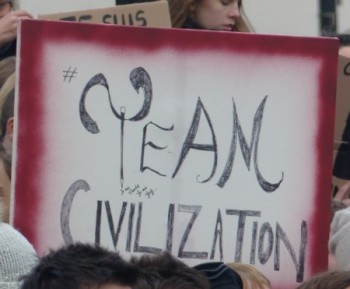We are developing the social individualist meta-context for the future. From the very serious to the extremely frivolous... lets see what is on the mind of the Samizdata people.
Samizdata, derived from Samizdat /n. - a system of clandestine publication of banned literature in the USSR [Russ.,= self-publishing house]
|
Tonight four terrified children are going to sleep among hostile strangers, torn away by force from their homes and their families because their parents committed the crime of living differently.
Tonight four children rescued from imprisonment and abusive parenting are able to take their first wondering look at the the wide world that had been denied to them.
Which is true? Search me. In my post of a month ago, “The morality of not teaching your child English”, I asked at what point the right of parents to raise their child according to their values must give way to the right of a child not to be cut off from the world. Language is not an issue in the real life story of the recent raid by the French police on the community variously known as the “Twelve Tribes” or “Tabitha’s Place”, but many of the other elements of my thought experiment, such as a self-isolating group not permitting their children to watch television or use the internet, are – allegedly – in place.
The Times reports:
Christian cult’s ‘racism, violence and child abuse’ leads to ten arrests
Police raided a fundamentalist Christian community that seeks to follow a 1st century lifestyle, arresting ten people and placing four children in care amid allegations of maltreatment.
The raid came following the launch of a criminal inquiry after a former member told prosecutors of the corporal punishment meted out by the Twelve Tribes community in southern France.
The group’s communities in France, Germany, the United States and elsewhere have long faced accusations of racism and of violence. They deny the claims and say they are misunderstood.
Jean-Christophe Muller, the state prosecutor in Pau in the Pyrenees, said 200 gendarmes accompanied by doctors had intervened at the group’s French base, a château in the hamlet of Sus, on Tuesday.
He said officers had been tipped off by the former member, but were stunned to discover a community of about 100 people cut off from the modern world.
“The children have never seen television or the internet and do not know what football is,” he said.
The Times story is quite similar to other reports in the French media. The sect has its own website, which has an English version. The existence of this website suggests that the Times may be wrong to claim that this sect prohibits the internet. Or the prohibition may not be absolute, or it may be applied to ordinary members but lifted for the elite or… any number of possibilities. One does not know which account to trust. No, make that “one does not know which account to distrust more”. Cruel and abusive cults do exist, but so do cruel and abusive governments.
The Twelve Tribes website gives their account of an earlier occasion when some children had been taken away from their parents by the German authorities in this link:
The parents of the children who were taken away permanently by the OLG Nurnberg are appealing the decision to the Federal Constitutional Court in Karlsruhe. There are a number of constitutional violations in the OLG rulings that must be heard by the honorable court. Here are some of them:
The court in its ruling admits that there is no evidence of abuse in the children. However, they reason that the mere beliefs of the parents are enough to justify taking away permanent custody.
In its reasoning the court takes the position that all spanking is abuse. The Jugendamt handbook says that all spanking is not abuse which supports what Parliament made clear in 2000 that the intent of the law was not to criminalize parents who spank
Ambitious police chiefs love operations like this. In 2008 David Friedman wrote a series of posts about the time when Texas police raided a ranch belonging to a group of fundamentalist Mormons and took large numbers of children into custody. Few of the dramatic initial claims of abuse were substantiated and the vast majority of the children were later returned to their parents, but only after many prevarications by the authorities that seemed motivated by a wish to deflect criticism of their heavy-handedness rather than out of any concern for the children. In “Taking Children from their Parents: The General Issue”, Friedman wrote,
Which raises the general question: Would it be better if governments had no power to remove children from their parents? It is easy to imagine, probably to point out, particular cases where such removal is justified. But in order to defend giving government the power to do something, you must argue not only that it can sometimes do good but that, on net, it can be expected to do more good than harm. Judging by what we have seen in Texas over the past two months, that is a hard argument to make.
This leads to a second question: Are there alternative way of protecting children from abusive parents? One obvious answer is that even if the state cannot take children away from their parents, it can still punish parents for the crime of killing or injuring their children. In my first book, I suggested a different approach: shifting power away from parents not to the state but to the children. Weaken or eliminate the legal rules that make it possible for parents to keep control over children, especially older children, who want to leave. Make it easier for adults who care about the risk of child abuse to offer refuge to runaways.
If you are an adult and want to work as a model in France, the French government will decide if the way you look is appropriate in their view. And if not, the people who hired you will be fined or jailed.
Uber banned for the second time in Germany:
A regional court in Frankfurt ruled that Uber’s low-cost ride-sharing service UberPop is now banned throughout the country. The case was brought by taxi union Taxi Deutschland that been battling Uber for over a year.
And the French state agrees:
Around 30 police officers were sent into the Parisian Uber headquarters on Monday as part of an investigation into its UberPop service, which connects drivers with passengers via a smartphone app.
The state really hates it when their Permit Raj and compliant patron rent-seekers get threatened. Next thing you know, uppity consumers sick of overpriced taxies might start thinking state state involvement was not necessary!
I understand why NickM, for instance, complains about all the people waving Je Suis Charlie signs at the recent Charlie Hebdo demos just over a week ago. But at least there were demos (Hebdemos?), and big ones. Whatever the finer points of the relationship between Islam and the rest of us, thousands upon thousands of people, in France millions, disapproved of cartoonists being killed, no matter how offensive anyone might think they had been, just because of various cartoons they had done. I agree that disapproval is not much. Ooh, they disapprove. But it’s a start. I mean, would you rather that all those millions of demonstrators had just shrugged their shoulders, stayed indoors and forgotten all about it?
And yes, there was plenty of hypocrisy involved, on the part of public personages who, only weeks or days before the attacks, had been saying more like: “Je Ne Suis Pas Charlie”, and who will be saying much the same as that in a few days or weeks time. But I prefer hypocrisy and inconsistency to brazen wickedness. If you demand consistency from public figures, you are liable to get consistent stupidity and consistent wickedness. The public attitudes that public people feel they need to strike, even if they strike them very insincerely or in a way that contradicts other things they have earlier said and done and will later say and do, still count for something.
I attended the demo in London’s Trafalgar Square, and I made a point of photoing signs that said other things besides Je Suis Charlie, of which this was my favourite:

For the benefit of those with no French, that means (unless my French is letting me down badly) something along the lines of: “Down With The Tyranny of The Offended”. Good one. See also the earlier posting here, in which our Prime Minister is reported as standing up for the same idea. And, see my paragraph above (which I had already written before that earlier posting had appeared) about how the public attitudes of public people do matter, however occasionally and inconsistently they may be expressed.
This next sign might have been my favourite. But, that T for Team looks too twiddly, and not clear enough and assertive enough. It’s like the guy who wrote the sign was just taking dictation and didn’t really mean it.

Or, it could just mean that here were some people demonstrating who had not done any such thing before. Because, this was not your usual demo, the sort of demo perpetrated by the demonstrating classes, so to speak. Which was another big plus, from where I was standing, photographing everything I could see.
You can view other photos that I took of signs that afternoon here.
The latest edition of Charlie Hebdo has a cartoon of the Prophet Mohammed on the cover. This is when we see who are the men, and who are the boys, so… well done to all the various newspapers who have shown some defiance to those who urged submission, and republished the image.

Satirical publication and well known needler of radical Islamists Charlie Hebdo has been attacked in France, with many people murdered. I wonder if there will be a wave of publications in Europe and elsewhere republishing Hebdo’s cartoon of Islamic State militant group leader, Abu Bakr al-Baghdadi, to show solidarity against this civilisation-level attack? That would be nice but I am not going to hold my breath.



Yes, here’s another Happy New Year to everyone, this time from French National Treasure Jean-Paul Belmondo, snapped by me (in amazement at how he looked – I think I last saw him in Borsalino) straight off of French TV (no idea which channel), at or around midnight on Dec 31/Jan 1:

I thought Belmondo had died several years ago. After seeing him on TV, I still suspect that maybe he did die, and that the museum where they keep all the dead (human) French National Treasures has a highly sophisticated animatronics department.
Via Jim Miller on Politics, I found this:
EU court orders France to pay thousands to Somali pirates
The EU’s top human rights court on Thursday ordered France to pay thousands of euros to Somali pirates who attacked French ships for “violating their rights” by holding them an additional 48 hours before taking them before a judge.
The Somali pirates were apprehended on the high seas by the French army on two separate occasions in 2008 and taken back to France for trial.
(The report is incorrect to call the ECHR an “EU court”. Judgements and precedents may mesh with EU law in ways I do not fully understand; but the ECHR is the creation of the Council of Europe, not the European Union.)
I sometimes think that this sort of judgement can only be the result of a deliberate strategy to discredit the words “human rights” in the eyes of the peoples of Europe. But why would anyone want to do that? Perhaps because it suits the immediate self-interest of the individual “human rights professionals”, and the future be damned.
By the way, it is possible to defend the Somali pirates on quasi-libertarian grounds; that they only do freelance what states regularly do without arousing condemnation. One of the commenters to the MSN piece appears to take that view. I don’t, although I do accept (make that “passionately proclaim”) that states continually get a pass on evil deeds just by calling themselves states. Even so, states that have acted as the pirates do – kidnapping and murdering passing holidaymakers – do not escape condemnation, and nor should anyone else.
When I read this story…
A former French intelligence officer who defected to al Qaida was among the targets of the first wave of U.S. air strikes in Syria last month, according to people familiar with the defector’s movements and identity. Two European intelligence officials described the former French officer as the highest ranking defector ever to go over to the terrorist group and called his defection one of the most dangerous developments in the West’s long confrontation with al Qaida.
…I started to wonder who gets to play what role in the inevitable Hollywood ‘based on real events’ feature length movie (which will of course change everything and make it a CIA defector, because everyone knows France is a place deep fried potatoes come from, not secret agents).
Ben Macintyre argues in the Times that the proliferation of road signs that order, warn, chide, and harry drivers, not to mention giving involuntary Welsh and Gaelic language lessons to those navigating busy roundabouts, has become a danger in its own right. “We’ve lost our way when it comes to road signs”. I suppose that link should have been preceded by:
\\\
\\
\
PAYWALL AHEAD
…but I thought it would be more fun to place the warning where it was too late for you to do anything about it.
Now, where was I? (as the actress said to the bishop coming on to the M6 from the A38(M)). Oh, that’s right. I did enjoy this exchange from the comments:
mumqueem
Sometimes I think there aren’t enough signs. Such as when negotiating an unknown town and directions to your destination just disappear. So you drive in circles until you pick up the relevant signs. I never have this problem in France.
John Hatch
@mumqueem
I also never have this problem in France.
It is one of the many advantages of not going there.
When my father first went to France, he disregarded the road signs. He relied on his map and the fact that he was sitting in the turret of a tank.
Earlier this week I got back from a week in Brittany. During the first few days of my stay, I and the friends I was staying with visited the island of Belle Ile. Their daughter is my god-daughter, and she was singing (very well) in a classical singing festival that happens in Belle Ile every year.
While in Belle Ile we also enjoyed other sorts of music making. In particular, at midday, in the fish market of Belle Ile’s biggest town, La Palais, we listened to a small beat combo called, as I later learned from the small print in some of my photographs, Les Gadgos. Les Gadgos are a bunch of blokes, but they have engaged a lead singer for their latest clutch of songs and their latest CD, a blond chanteuse named Mélody Linhart, who looked weirdly matter-of-fact in her days clothes. But she sang very well, in English. She did various venerable American standards, like St James Infirmary, and slightly more recent American movie tunes, including I Want To Be Like You. She made the latter piece of froth sound almost as profound and existential as St James Infirmary.
But take a look at this other Les Gadjos person, who I now know to be called Clément Lenoble:

A classic French type, I think you will agree. But that cigarette was actually quite a surprise, because Clément Lenoble was one of the very few people whom I observed during my week in France who was smoking. There were a few. He wasn’t the only one. But the basic news is, those Frenchies are no longer fumer-ing. Not the sort who live in or summer in Brittany, anyway.
Instead, this business is on the up and up:

That was just a clutch of e-cigarettes in the window of a shop that also sold other stuff. But later, I came across an entire shop devoted to this one product:

French smokers are a dying breed. No doubt, anti-smoking fanatics would reply that they’re a dying breed because smoking is killing them all off, and I do agree that this change of habit is probably a good thing. But even so, I miss guys like this, singing their gravel-voiced chansons in bars, with their whiskey glasses on the piano and their gauloises hanging down from their creased and lived-in faces. Or maybe I just miss the idea of such people, being around, in France.
Smoking is now illegal in most public places in France. I just wish les pouvoirs-that-be had been content to let the habit die away of its own accord. But that is not how such people think.
I also photoed many other more fun things.
→ Continue reading: Some Brittany holiday snaps
|
Who Are We? The Samizdata people are a bunch of sinister and heavily armed globalist illuminati who seek to infect the entire world with the values of personal liberty and several property. Amongst our many crimes is a sense of humour and the intermittent use of British spelling.
We are also a varied group made up of social individualists, classical liberals, whigs, libertarians, extropians, futurists, ‘Porcupines’, Karl Popper fetishists, recovering neo-conservatives, crazed Ayn Rand worshipers, over-caffeinated Virginia Postrel devotees, witty Frédéric Bastiat wannabes, cypherpunks, minarchists, kritarchists and wild-eyed anarcho-capitalists from Britain, North America, Australia and Europe.
|













